- Clone
- A18087E (See other available formats)
- Regulatory Status
- RUO
- Other Names
- T cell immunoglobulin and mucin domain containing protein 3, hepatitis virus cellular receptor 2, CD366
- Isotype
- Mouse IgG1, κ
- Ave. Rating
- Submit a Review
- Product Citations
- publications
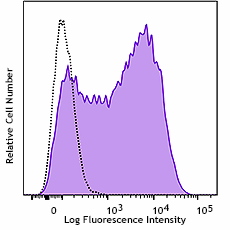
-

PHA-stimulated (3 days) human peripheral blood lymphocytes were stained with purified anti-human CD366 (Tim-3) (clone A18087E) (filled histogram) or mouse IgG1, ᴋ isotype control (open histogram), followed by anti-mouse IgG PE. -

Human peripheral lymphocytes were stained with anti-human CD3 APC/Cyanine7 and purified anti-human CD366 (Tim-3) (clone A18087E) (left) or mouse IgG1, ᴋ isotype control (right), followed by anti-mouse IgG PE.
| Cat # | Size | Price | Quantity Check Availability | Save | ||
|---|---|---|---|---|---|---|
| 364802 | 100 µg | 223 CHF | ||||
CD366 (Tim-3) is a transmembrane protein also known as T cell immunoglobulin and mucin domain containing protein-3. Tim-3 is expressed at high levels on activated T cells (preferentially on Th1 cells, monocytes/macrophages, and dendritic cells). Tim-3 has also been shown to exist as a soluble protein. Cells expressing Tim-3 are present at high levels in the CNS of animals at the onset of experimental autoimmune encephalomyelitis (EAE), a disease mediated by lymphocytes secreting Th1-like cytokines. Tim-3 has been proposed to inhibit Th1-mediated immune responses and promote immunological tolerance.
Product DetailsProduct Details
- Verified Reactivity
- Human
- Antibody Type
- Monoclonal
- Host Species
- Mouse
- Immunogen
- Recombinant human Tim-3
- Formulation
- Phosphate-buffered solution, pH 7.2, containing 0.09% sodium azide
- Preparation
- The antibody was purified by affinity chromatography.
- Concentration
- 0.5 mg/mL
- Storage & Handling
- The antibody solution should be stored undiluted between 2°C and 8°C.
- Application
-
FC - Quality tested
- Recommended Usage
-
Each lot of this antibody is quality control tested by immunofluorescent staining with flow cytometric analysis. For flow cytometric staining, the suggested use of this reagent is ≤ 1.0 µg per million cells in 100 µL volume. It is recommended that the reagent be titrated for optimal performance for each application.
- RRID
-
AB_2892442 (BioLegend Cat. No. 364802)
Antigen Details
- Structure
- Transmembrane protein containing immunoglobulin domain and mucin-like domain; can exist as a soluble form lacking mucin and transmembrane domains
- Distribution
-
Activated T cells, preferentially on Th1 cells, monocytes, dendritic cells
- Function
- CD366 plays a role in regulating macrophage activation, checkpoint inhibitor, T cell apoptosis and immune tolerance
- Ligand/Receptor
- Galectin-9 and PtdSer
- Molecular Family
- CD Molecules, Immune Checkpoint Receptors
- Antigen References
-
- Hafler DA and Kuchroo V. 2008. J Exp Med. 205:2699.
- Zhu C, et al. 2005. Nat Immunol. 6:1245.
- Wang F, et al. 2009. Immunobiology. 214:342.
- Gene ID
- 84868 View all products for this Gene ID
- UniProt
- View information about CD366 on UniProt.org
Related Pages & Pathways
Pages
Related FAQs
Other Formats
View All CD366 (Tim-3) Reagents Request Custom Conjugation| Description | Clone | Applications |
|---|---|---|
| Purified anti-human CD366 (Tim-3) | A18087E | FC |
| APC anti-human CD366 (Tim-3) | A18087E | FC |
| PE anti-human CD366 (Tim-3) | A18087E | FC |
| Brilliant Violet 421™ anti-human CD366 (Tim-3) | A18087E | FC |
| PE/Fire™ 744 anti-human CD366 (Tim-3) | A18087E | FC |
| APC/Cyanine7 anti-human CD366 (Tim-3) Antibody | A18087E | FC |
| Spark PLUS B550™ anti-human CD366 (Tim-3) | A18087E | FC |
| KIRAVIA Blue 520™ anti-human CD366 (Tim-3) Antibody | A18087E | FC |
| Spark Red™ 718 anti-human CD366 (Tim-3) | A18087E | FC |
| PE/Cyanine7 anti-human CD366 (Tim-3) | A18087E | FC |
Compare Data Across All Formats
This data display is provided for general comparisons between formats.
Your actual data may vary due to variations in samples, target cells, instruments and their settings, staining conditions, and other factors.
If you need assistance with selecting the best format contact our expert technical support team.
-
Purified anti-human CD366 (Tim-3)
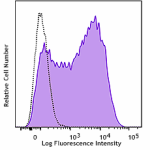
PHA-stimulated (3 days) human peripheral blood lymphocytes w... 
Human peripheral lymphocytes were stained with anti-human CD... -
APC anti-human CD366 (Tim-3)
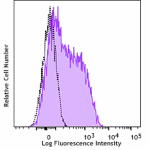
PHA-stimulated (3 days) human peripheral blood lymphocytes w... 
PHA-stimulated human peripheral blood lymphocytes were stain... -
PE anti-human CD366 (Tim-3)
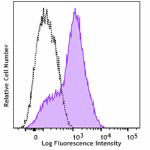
PHA-stimulated (3 days) human peripheral blood lymphocytes w... -
Brilliant Violet 421™ anti-human CD366 (Tim-3)
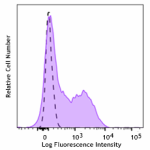
PHA-stimulated (3 days) human peripheral blood lymphocytes w... 
PHA-stimulated human peripheral blood lymphocytes were stain... -
PE/Fire™ 744 anti-human CD366 (Tim-3)

PHA-stimulated (3 days) human peripheral blood mononuclear c... 
Human peripheral blood lymphocytes were stained with anti-hu... -
APC/Cyanine7 anti-human CD366 (Tim-3) Antibody

PHA-stimulated (3 days) human peripheral blood lymphocytes w... -
Spark PLUS B550™ anti-human CD366 (Tim-3)

PHA-stimulated (3 days) human peripheral blood lymphocytes w... -
KIRAVIA Blue 520™ anti-human CD366 (Tim-3) Antibody

PHA-activated (3 days) human peripheral blood lymphocytes we... -
Spark Red™ 718 anti-human CD366 (Tim-3)

PHA-activated (3 days) human peripheral blood lymphocytes we... -
PE/Cyanine7 anti-human CD366 (Tim-3)

PHA-activated (3 days) human peripheral blood lymphocytes we...
 Login / Register
Login / Register 








Follow Us